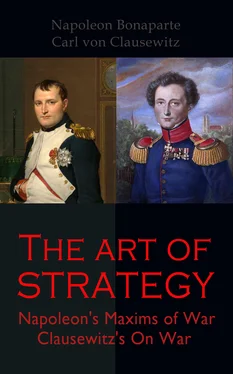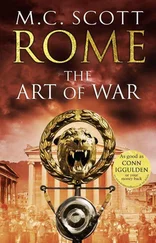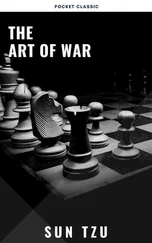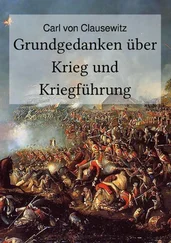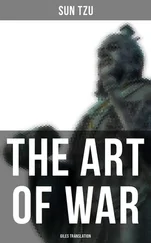“The more I advanced with the work, and the more I yielded to the spirit of investigation, so much the more I was also led to system; and thus, then, chapter after chapter has been inserted.
“My ultimate view has now been to go through the whole once more, to establish by further explanation much of the earlier treatises, and perhaps to condense into results many analyses on the later ones, and thus to make a moderate whole out of it, forming a small octavo volume. But it was my wish also in this to avoid everything common, everything that is plain of itself, that has been said a hundred times, and is generally accepted; for my ambition was to write a book that would not be forgotten in two or three years, and which any one interested in the subject would at all events take up more than once.”
In Coblentz, where he was much occupied with duty, he could only give occasional hours to his private studies. It was not until 1818, after his appointment as Director of the General Academy of War at Berlin, that he had the leisure to expand his work, and enrich it from the history of modern wars. This leisure also reconciled him to his new avocation, which, in other respects, was not satisfactory to him, as, according to the existing organisation of the Academy, the scientific part of the course is not under the Director, but conducted by a Board of Studies. Free as he was from all petty vanity, from every feeling of restless, egotistical ambition, still he felt a desire to be really useful, and not to leave inactive the abilities with which God had endowed him. In active life he was not in a position in which this longing could be satisfied, and he had little hope of attaining to any such position: his whole energies were therefore directed upon the domain of science, and the benefit which he hoped to lay the foundation of by his work was the object of his life. That, notwithstanding this, the resolution not to let the work appear until after his death became more confirmed is the best proof that no vain, paltry longing for praise and distinction, no particle of egotistical views, was mixed up with this noble aspiration for great and lasting usefulness.
Thus he worked diligently on, until, in the spring of 1830, he was appointed to the artillery, and his energies were called into activity in such a different sphere, and to such a high degree, that he was obliged, for the moment at least, to give up all literary work. He then put his papers in order, sealed up the separate packets, labelled them, and took sorrowful leave of this employment which he loved so much. He was sent to Breslau in August of the same year, as Chief of the Second Artillery District, but in December recalled to Berlin, and appointed Chief of the Staff to Field-Marshal Count Gneisenau (for the term of his command). In March 1831, he accompanied his revered Commander to Posen. When he returned from there to Breslau in November after the melancholy event which had taken place, he hoped to resume his work and perhaps complete it in the course of the winter. The Almighty has willed it should be otherwise. On the 7th November he returned to Breslau; on the 16th he was no more; and the packets sealed by himself were not opened until after his death.
The papers thus left are those now made public in the following volumes, exactly in the condition in which they were found, without a word being added or erased. Still, however, there was much to do before publication, in the way of putting them in order and consulting about them; and I am deeply indebted to several sincere friends for the assistance they have afforded me, particularly Major O’Etzel, who kindly undertook the correction of the Press, as well as the preparation of the maps to accompany the historical parts of the work. I must also mention my much-loved brother, who was my support in the hour of my misfortune, and who has also done much for me in respect of these papers; amongst other things, by carefully examining and putting them in order, he found the commencement of the revision which my dear husband wrote in the year 1827, and mentions in the Notice hereafter annexed as a work he had in view. This revision has been inserted in the place intended for it in the first book (for it does not go any further).
There are still many other friends to whom I might offer my thanks for their advice, for the sympathy and friendship which they have shown me; but if I do not name them all, they will, I am sure, not have any doubts of my sincere gratitude. It is all the greater, from my firm conviction that all they have done was not only on my own account, but for the friend whom God has thus called away from them so soon.
If I have been highly blessed as the wife of such a man during one and twenty years, so am I still, notwithstanding my irreparable loss, by the treasure of my recollections and of my hopes, by the rich legacy of sympathy and friendship which I owe the beloved departed, by the elevating feeling which I experience at seeing his rare worth so generally and honourably acknowledged.
The trust confided to me by a Royal Couple is a fresh benefit for which I have to thank the Almighty, as it opens to me an honourable occupation, to which I devote myself. May this occupation be blessed, and may the dear little Prince who is now entrusted to my care, some day read this book, and be animated by it to deeds like those of his glorious ancestors.
Written at the Marble Palace, Potsdam, 30th June, 1832.
MARIE VON CLAUSEWITZ,
Born Countess Brühl, Oberhofmeisterinn to H.R.H. the Princess William.
Table of Contents
I look upon the first six books, of which a fair copy has now been made, as only a mass which is still in a manner without form, and which has yet to be again revised. In this revision the two kinds of War will be everywhere kept more distinctly in view, by which all ideas will acquire a clearer meaning, a more precise direction, and a closer application. The two kinds of War are, first, those in which the object is the overthrow of the enemy , whether it be that we aim at his destruction, politically, or merely at disarming him and forcing him to conclude peace on our terms; and next, those in which our object is merely to make some conquests on the frontiers of his country , either for the purpose of retaining them permanently, or of turning them to account as matter of exchange in the settlement of a peace. Transition from one kind to the other must certainly continue to exist, but the completely different nature of the tendencies of the two must everywhere appear, and must separate from each other things which are incompatible.
Besides establishing this real difference in Wars, another practically necessary point of view must at the same time be established, which is, that War is only a continuation of State policy by other means . This point of view being adhered to everywhere, will introduce much more unity into the consideration of the subject, and things will be more easily disentangled from each other. Although the chief application of this point of view does not commence until we get to the eighth book, still it must be completely developed in the first book, and also lend assistance throughout the revision of the first six books. Through such a revision the first six books will get rid of a good deal of dross, many rents and chasms will be closed up, and much that is of a general nature will be transformed into distinct conceptions and forms.
The seventh book—on attack—for the different chapters of which sketches are already made, is to be considered as a reflection of the sixth, and must be completed at once, according to the above-mentioned more distinct points of view, so that it will require no fresh revision, but rather may serve as a model in the revision of the first six books.
Читать дальше
